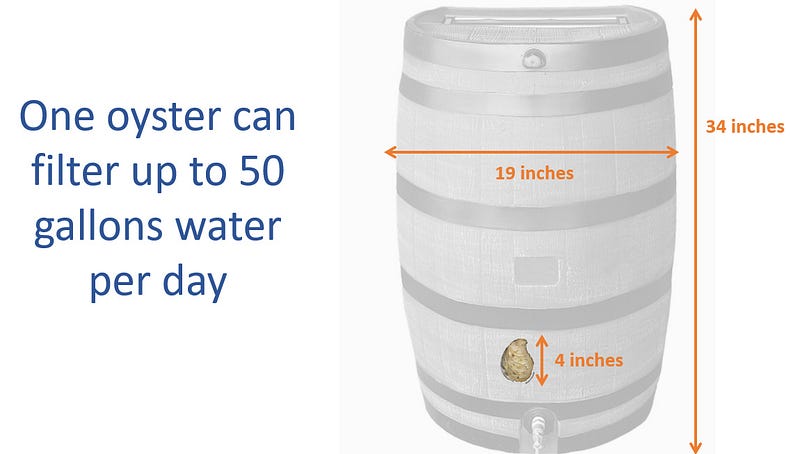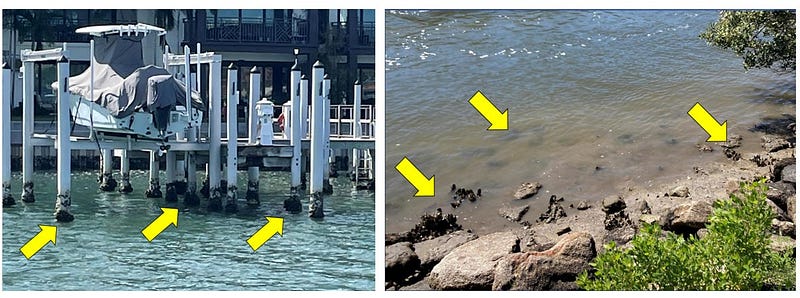# Oysters: The Unsung Heroes of Climate Resilience
Written on
Chapter 1: The Unexpected Value of Oysters
Initially, I never considered oysters to be appealing. My one experience with them left me feeling unimpressed; they seemed slippery, bland, and far from charming. Unlike the endearing manatees or dolphins, oysters lack a certain cuteness. However, a recent assignment in my Coastal Ecology 101 class completely transformed my viewpoint. These seemingly plain bivalves are, in fact, vital allies in the fight against climate change, and we desperately need more of them.
Oysters thrive in shallow saltwater and brackish environments worldwide, attaching themselves to hard surfaces like rocks, dock pilings, and shells. As we face an impending climate crisis, these unassuming creatures play a significant role in maintaining the ecological balance of our planet.
Section 1.1: Keystone Species in Action
To understand the importance of oysters, consider an architectural arch. The keystone, the central block at the top, is crucial; without it, the entire structure collapses.
In ecological terms, a keystone species is one that, if removed, leads to severe consequences for other organisms. Oysters fit this definition perfectly. They provide essential shelter for fish and crabs while fostering conditions for seagrass growth. Seagrasses, in turn, serve as food for various marine animals, including sea turtles and manatees. Without oysters, the entire marine ecosystem would be at risk.
Section 1.2: Protecting Our Coasts
Oysters grow in large colonies, which helps safeguard coastlines by stabilizing sediments, minimizing erosion, and encouraging seagrass growth. This is especially crucial for hurricane-prone regions like Florida. During severe storms, oyster reefs and seagrasses act as natural barriers, absorbing wave energy and protecting the coastline from damage.
According to NOAA Fisheries, a single acre of oyster reef habitat can yield up to $2,125 annually in shoreline stabilization benefits—a smart investment for hurricane preparedness.
Section 1.3: Nature’s Water Filters
Beyond their structural benefits, oysters also function as natural water filters. Each oyster can filter between 25 and 50 gallons of water each day. To visualize this, consider a large trash can; that's roughly the volume of water an average oyster cleans daily. Their remarkable filtering abilities are vital for keeping our recreational waters clean and healthy.

Chapter 2: Reviving Oyster Populations
Despite their benefits, overharvesting, pollution, and habitat loss have led to a staggering decline of 85% in global oyster populations. To aid in restoring these vital creatures, many organizations are creating oyster reefs.
Oysters naturally colonize the shells of other oysters, which is why community groups often use discarded shells from restaurants to create oyster bags and mats. These mesh bags filled with oyster shells are strategically placed along shorelines or near docks to attract and support new oyster populations. This simple and cost-effective method allows anyone to contribute to conservation efforts.

Section 2.1: How You Can Help
If you own coastal property or know someone who does, consider whether it might be suitable for an oyster reef and reach out to a local conservation group. If you have a dock, you can participate in Living Docks programs by hanging oyster bags from the pilings, such as Florida’s Living Docks initiative.
Additionally, volunteering at community bagging events is a great way to get involved. Organizations like Brevard Zoo, Florida Oceanographic Society, and Marine Discovery Center frequently host programs where volunteers can help create oyster bags and mats. A quick online search for "oyster restoration + [your location]" can point you in the right direction.
If you enjoy oysters, encourage your favorite restaurants to recycle their shells for these restoration projects. Advocate for clean water initiatives and promote local businesses and government support for restoration efforts.
I’m grateful for the new perspective I’ve gained regarding these small but mighty bivalves. Oysters do more than just serve as a delicacy; they are crucial for the health of our waters, beaches, and coastal wildlife. Let's give these unsung heroes the recognition and support they need.
Karen McLaughlin is a Florida Master Naturalist and HR Talent Development professional passionate about writing on nature, self-improvement, and leadership.
Enjoy this article? Join her on Florida Native for suburban adventures exploring Florida's flora and fauna.